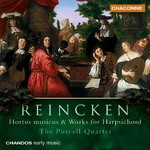
Hortus musicus and Works for Harpsichord
 $40.00
Out of Stock
$40.00
Out of Stock6+ weeks add to cart
REINCKEN
Hortus musicus and Works for Harpsichord
Purcell Quartet
[ Chandos Chaconne / CD ]
Release Date: Thursday 22 August 2002
This item is currently out of stock. It may take 6 or more weeks to obtain from when you place your order as this is a specialist product.
''Listening to the suites of Hortus musicus, I am at a loss to know why they are not played more often. The italianate part-writing is elegantly crafted, well-sustained and plentifully endowed with harmonic interest. They are qualities to which the [Purcell] Quartet responds with insight and evident warmth of sentiment.''
BBC Music Magazine
Reincken is a composer almost without representation in the international CD catalogue. There are no competing versions of this recording of selections from his Hortus munsicus.
Robert Woolley is universally regarded as one of the world's finest harpsichordists.
The Purcell Quartet is a specialist in this repertoire, and its recordings on the Chaconne label have been critically acclaimed.
This CD features some of the best of Reincken's music performed by acclaimed artists and recorded to produce the famous Chandos sound.
In the late seventeenth century Hamburg was the most cosmopolitan city in Germany. It was one of the first cities outside Italy to have public concertos and an opera house. Johann Adam Reincken, organist at the Katharinenkirche from 1663, exemplified Hamburg's sophisticated, proud culture. Reincken presided over a colossal organ, a symbol of civic wealth. His improvisations at Vespers were admired by visiting merchants and gave Hamburg's music the same international reputation as its trade. And Reincken's lifestyle and vanity were legendary. An obituary of Reincken by Johann Mettheson, a later Hamburg musician, salaciously described his love of wine and women, noting that Reincken's will did not forget the 'unknown ladies in his house at his death'.
Reincken was renowned as an improviser and, perhaps because he jealously guarded his art, he committed little keyboard music to paper. Instead the main item in Reincken's surviving output is Hortus musicus, his 1687 set of six partitas for two violins, viola da gamba and continuo. Like many publications of German chamber music during this period Hortus musicus stresses its suitability for church of domestic use.
Over twenty years after Hortus musicus was published Johann Sebastian Bach made keyboard arrangements of the A minor partita, the first half of the C major sonata and the fugue from the B flat partita. Bach spent some of his teenage years at Lüneburg and travelled from there to hear Reincken in Hamburg.
When Bach was at the peak if his compositional and performing power he again met Reincken. In 1720 Bach visited the Katharinenkirche, registering his candidacy for the post as organist at the nearby Jacobkirche and probably also assessing his chances of succeeding the 97-year-old Reincken. Faced with Bach's audacity in trying to better his acheivements, Reincken for once set aside his vanity, declaring: 'I thought that this art was dead, but I see it lives on in you'.
Reviews
''[The Purcell Quartet plays] with an appealing grace and dance-like quality.''
BBC Music Magazine on CHAN 0595 (J.S. Bach - Harpsichord Concertos)
''Robert Woolley… never for a moment lets us forget that we are listening to a great composer.''
Cork Examiner on CHAN 0543 (J.C. Bach - Sonatas)
''Recommended both for the under-recorded music and for the high quality of the music-making.''
American Record Guide
''The Purcell Quartet bring their customary virtues to bear, namely a sweetly transparent ensemble sound… a fleet-footed nimbleness in passage-work, and a good feeling for the music's various moods.''
Gramophone
''Listening to the suites of Hortus musicus, I am at a loss to know why they are not played more often. The italianate part-writing is elegantly crafted, well-sustained and plentifully endowed with harmonic interest. They are qualities to which the [Purcell] Quartet responds with insight and evident warmth of sentiment.''
BBC Music Magazine
Tracks:
Partita No. 1
Ballett: Partite diverse
From Partita No. 2
Toccata
From Partita No. 3
From Partita No. 4
Suite
From Partita No. 5
From Partita No. 6



